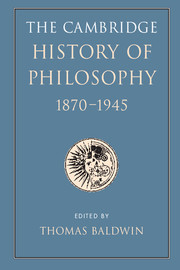Book contents
- Frontmatter
- Contents
- List of contributors
- Introduction
- I 1870–1914
- II 1914–1945
- 8 Logic and philosophy: the analytic programme
- 9 The diversity of philosophy
- 10 Knowledge, language, and the end of metaphysics
- 11 Philosophy and the exact sciences
- 12 Mind and its place in nature
- 13 Philosophy and social science
- 14 Ethics, religion, and the arts
- 15 Law and politics
- 62 Hans Kelsen and normative legal positivism
- 63 The liberal democratic state: defences and developments
- 64 The liberal democratic state: critics
- Biobibliographical appendix
- Bibliography
- INDEX
- References
64 - The liberal democratic state: critics
from 15 - Law and politics
Published online by Cambridge University Press: 28 March 2008
- Frontmatter
- Contents
- List of contributors
- Introduction
- I 1870–1914
- II 1914–1945
- 8 Logic and philosophy: the analytic programme
- 9 The diversity of philosophy
- 10 Knowledge, language, and the end of metaphysics
- 11 Philosophy and the exact sciences
- 12 Mind and its place in nature
- 13 Philosophy and social science
- 14 Ethics, religion, and the arts
- 15 Law and politics
- 62 Hans Kelsen and normative legal positivism
- 63 The liberal democratic state: defences and developments
- 64 The liberal democratic state: critics
- Biobibliographical appendix
- Bibliography
- INDEX
- References
Summary
The crisis consists precisely in the fact that the old is dying and the new cannot be born; in this interregnum a great variety of morbid symptoms appear.
Antonio Gramsci (1975 [1971: 276])Following the catastrophe of the First World War, philosophical critics on both left and right posed their challenges to liberal-democratic politics in terms of a crisis of civilisation. The First World War had ushered out the last vestiges of Europe’s old regime; no one imagined a new Metternich-legitimist restoration. But what might be the ‘new regime’ of modernity that could resolve the crisis? The answer depended in part upon one’s national vantage-point. The focus here will be on the central and southern European contexts where communist revolutions were launched in 1919–20 only to be supplanted by fascist reactions thereafter. In France, the political outcomes were different but the intellectual environment, similar. Only in Britain and the United States did bourgeois institutions appear largely unchallenged.
While even partisans of liberal democracy understood that ‘rescuing bourgeois Europe meant recasting bourgeois Europe’ (Maier 1975: 594), its critics sought to sweep it aside in a bold revolutionary stroke. For them, fin-de-siècle fears that a looming mass society would become a quantitative, materialist nightmare had been borne out, necessitating a turn to radical solutions. A radical conservatism demanding new institutions to restore old values came into full flower, particularly in Germany, where the fears had run deepest, while Marxists, emboldened by the Bolshevik triumph in 1917, sought to theorise the nature of, and preconditions for, a new basis of Western civilisation. Both extremes appreciated the raw power of ‘Americanism’ as a principle of social organisation, but despite occasional admirers (like Gramsci), most detested it as an alien invasion.
- Type
- Chapter
- Information
- The Cambridge History of Philosophy 1870–1945 , pp. 755 - 764Publisher: Cambridge University PressPrint publication year: 2003

